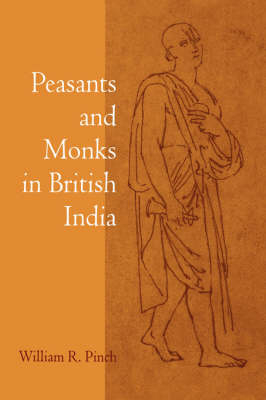
Peasants and Monks in British India
Seiten
1996
University of California Press (Verlag)
978-0-520-20061-6 (ISBN)
University of California Press (Verlag)
978-0-520-20061-6 (ISBN)
- Lieferbar (Termin unbekannt)
- Versandkostenfrei
- Auch auf Rechnung
- Artikel merken
Tackles one of the most important but most neglected fields of the colonial history of India: the relation between monasticism and caste.
In this compelling social history, William R. Pinch tackles one of the most important but most neglected fields of the colonial history of India: the relation between monasticism and caste. The highly original inquiry yields rich insights into the central structure and dynamics of Hindu society - insights that are not only of scholarly but also of great political significance. Perhaps no two images are more associated with rural India than the peasant who labors in an oppressive, inflexible social structure and the ascetic monk who denounces worldly concerns. Pinch argues that, contrary to these stereotypes, North India's monks and peasants have not been passive observers of history; they have often been engaged with questions of identity, status, and hierarchy - particularly during the British period. Pinch's work is especially concerned with the ways each group manipulated the rhetoric of religious devotion and caste to further its own agenda for social reform.
Although their aims may have been quite different - Ramanandi monastics worked for social equity, while peasants agitated for higher social status - the strategies employed by these two communities shaped the popular political culture of Gangetic north India during and after the struggle for independence from the British.
In this compelling social history, William R. Pinch tackles one of the most important but most neglected fields of the colonial history of India: the relation between monasticism and caste. The highly original inquiry yields rich insights into the central structure and dynamics of Hindu society - insights that are not only of scholarly but also of great political significance. Perhaps no two images are more associated with rural India than the peasant who labors in an oppressive, inflexible social structure and the ascetic monk who denounces worldly concerns. Pinch argues that, contrary to these stereotypes, North India's monks and peasants have not been passive observers of history; they have often been engaged with questions of identity, status, and hierarchy - particularly during the British period. Pinch's work is especially concerned with the ways each group manipulated the rhetoric of religious devotion and caste to further its own agenda for social reform.
Although their aims may have been quite different - Ramanandi monastics worked for social equity, while peasants agitated for higher social status - the strategies employed by these two communities shaped the popular political culture of Gangetic north India during and after the struggle for independence from the British.
William R. Pinch is Assistant Professor of History at Wesleyan University.
| Erscheint lt. Verlag | 18.6.1996 |
|---|---|
| Verlagsort | Berkerley |
| Sprache | englisch |
| Gewicht | 363 g |
| Themenwelt | Geschichte ► Allgemeine Geschichte ► Neuzeit (bis 1918) |
| Geisteswissenschaften ► Geschichte ► Regional- / Ländergeschichte | |
| Geschichte ► Teilgebiete der Geschichte ► Wirtschaftsgeschichte | |
| Geisteswissenschaften ► Religion / Theologie ► Hinduismus | |
| ISBN-10 | 0-520-20061-6 / 0520200616 |
| ISBN-13 | 978-0-520-20061-6 / 9780520200616 |
| Zustand | Neuware |
| Haben Sie eine Frage zum Produkt? |
Mehr entdecken
aus dem Bereich
aus dem Bereich
Europa 1848/49 und der Kampf für eine neue Welt
Buch | Hardcover (2023)
DVA (Verlag)
CHF 67,20
Giordano Bruno - ein ketzerisches Leben
Buch | Hardcover (2024)
C.H.Beck (Verlag)
CHF 41,85


